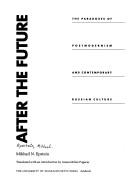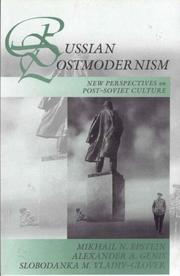| Listing 1 - 10 of 10 |
Sort by
|
Book
ISBN: 9781618116321 1618116320 9781618116338 1618116339 1618119826 Year: 2017 Publisher: Boston, MA
Abstract | Keywords | Export | Availability | Bookmark
 Loading...
Loading...Choose an application
- Reference Manager
- EndNote
- RefWorks (Direct export to RefWorks)
This book explores the major paradoxes of Russian literature as a manifestation of both tragic and ironic contradictions of human nature and national character. Russian literature, from Pushkin and Gogol to Chekhov, Nabokov and to postmodernist writers, is studied as a holistic text that plays on the reversal of such opposites as being and nothingness, reality and simulation, and rationality and absurdity. The glorification of Mother Russia exposes her character as a witch; a little man is transformed into a Christ figure; consistent rationality betrays its inherent madness, and extreme verbosity produces the effect of silence. The greatest Russian writers were masters of spiritual self-denial and artistic self-destruction, which explains many paradoxes and unpredictable twists of Russian history up to our time.
Paradox in literature. --- Russian literature --- Russian literature. --- History and criticism. --- Paradoxes in literature
Book
ISBN: 9781501350597 9781501350610 9781501350603 9781501350627 9781501380914 Year: 2021 Publisher: London Bloomsbury
Abstract | Keywords | Export | Availability | Bookmark
 Loading...
Loading...Choose an application
- Reference Manager
- EndNote
- RefWorks (Direct export to RefWorks)
"This groundbreaking work by one of the world's foremost theoreticians of culture and scholars of Russian philosophy gives for the first time a systematic examination of the development of Russian philosophy during the late Soviet period. Countering the traditional view of an intellectual wilderness under the Soviet regime, Mikhail Epstein provides a comprehensive account of Russian thought of the second half of the 20th century that is highly sophisticated without losing clarity. It provides new insights into previously mostly ignored areas such as late Soviet Russian nationalism and Eurasianism, religious thought, cosmism and esoterism, and postmodernism and conceptualism. Epstein shows how Russian philosophy has long been trapped in an intellectual prison of its own making as it sought to create its own utopia. However, he demonstrates that it is time to reappraise Russian thought, now freed from the bonds of Soviet totalitarianism and ideocracy but nevertheless dangerously engaged into new nationalist aspirations and metaphysical radicalism. We are left with not only a new and exciting interpretation of recent Russian intellectual history, but also the opportunity to rethink our philosophical heritage"--
Philosophy, Russian --- Philosophy and religion --- Soviet Union --- Intellectual life. --- Idealism, Russian. --- Political philosophy. Social philosophy --- anno 1900-1999 --- Russia
Book
ISBN: 9781501316395 Year: 2019 Publisher: London Bloomsbury Academic
Abstract | Keywords | Export | Availability | Bookmark
 Loading...
Loading...Choose an application
- Reference Manager
- EndNote
- RefWorks (Direct export to RefWorks)
Book
ISBN: 1472542886 1283700867 1441160949 9781441160942 9781283700863 9781441100467 1441100466 9781441155078 1441155074 9781472542885 9781441121554 1441121552 Year: 2012 Publisher: New York Bloomsbury
Abstract | Keywords | Export | Availability | Bookmark
 Loading...
Loading...Choose an application
- Reference Manager
- EndNote
- RefWorks (Direct export to RefWorks)
In his famous classification of the sciences, Francis Bacon not only catalogued those branches of knowledge that already existed in his time, but also anticipated the new disciplines he believed would emerge in the future: the "desirable sciences." Mikhail Epstein echoes, in part, Bacon's vision and outlines the "desirable" disciplines and methodologies that may emerge in the humanities in response to the new realities of the twenty-first century. Are the humanities a purely scholarly field, or should they have some active, constructive supplement? We know that technology serves as the practical extension of the natural sciences, and politics as the extension of the social sciences. Both technology and politics are designed to transform what their respective disciplines study objectively. The Transformative Humanities: A Manifesto addresses the question: Is there any activity in the humanities that would correspond to the transformative status of technology and politics? It argues that we need a practical branch of the humanities which functions similarly to technology and politics, but is specific to the cultural domain
Humanities --- Learning and scholarship. --- Erudition --- Scholarship --- Civilization --- Intellectual life --- Education --- Research --- Scholars --- Philosophy. --- Learning and scholarship --- Philosophy

ISBN: 1122054157 0585155097 9780585155098 0870239732 0870239740 9780870239731 9780870239748 9781122054157 Year: 1995 Publisher: Amherst University of Massachusetts press
Abstract | Keywords | Export | Availability | Bookmark
 Loading...
Loading...Choose an application
- Reference Manager
- EndNote
- RefWorks (Direct export to RefWorks)
Postmodernism --- Russia & Former Soviet Republics --- Regions & Countries - Europe --- History & Archaeology --- Post-modernism --- Postmodernism (Philosophy) --- Arts, Modern --- Avant-garde (Aesthetics) --- Modernism (Art) --- Philosophy, Modern --- Post-postmodernism --- Russia (Federation) --- Intellectual life. --- Sociology of culture --- Russia
Book
ISBN: 9004398341 Year: 2019 Publisher: Leiden ; Boston : Brill Rodopi,
Abstract | Keywords | Export | Availability | Bookmark
 Loading...
Loading...Choose an application
- Reference Manager
- EndNote
- RefWorks (Direct export to RefWorks)
In this book, Mikhail Epstein offers a systematic theory of modalities (the actual, possible, and necessary), as applied to the discourse of philosophy in its post-Kantian and especially post-Derridean perspectives. He relies on his own experience of living in the USSR and the US, dominated respectively by imperative and possibilist modalities. Possibilism assumes that a thing or event acquires meaning only in the context of its multiple possibilities, inviting counterfactual and conditional modes of description. The author focuses on the creative potentials of possibilistic thinking and its heuristic value. The book demonstrates the range of modal approaches to society, culture, ethics, and language, and outlines potentiology as a new philosophical discipline interacting with ontology and epistemology.


ISBN: 1571810986 1782388656 9781782388654 Year: 2015 Publisher: New York Oxford
Abstract | Keywords | Export | Availability | Bookmark
 Loading...
Loading...Choose an application
- Reference Manager
- EndNote
- RefWorks (Direct export to RefWorks)
Recent decades have been decisive for Russia not only politically but culturally as well. The end of the Cold War has enabled Russia to take part in the global rise and crystallization of postmodernism. This volume investigates the manifestations of this crucial trend in Russian fiction, poetry, art, and spirituality, demonstrating how Russian postmodernism is its own unique entity. It offers a point of departure and valuable guide to an area of contemporary literary-cultural studies insufficiently represented in English-language scholarship. This second edition includes additional essays on the topic and a new introduction examining the most recent developments.
Book

ISBN: 9781782388654 Year: 2015 Publisher: New York Oxford
Abstract | Keywords | Export | Availability | Bookmark
 Loading...
Loading...Choose an application
- Reference Manager
- EndNote
- RefWorks (Direct export to RefWorks)
Book

ISBN: 1618117211 9781618117212 9781618117205 1618117203 1618117785 9781618117786 Year: 2018 Publisher: Boston, MA
Abstract | Keywords | Export | Availability | Bookmark
 Loading...
Loading...Choose an application
- Reference Manager
- EndNote
- RefWorks (Direct export to RefWorks)
This bilingual collection in honor of the great scholar and writer Alexander Zholkovsky brings together new work from forty-four leading scholars in nine countries. Like Zholkovsky's oeuvre, this volume covers a broad range of subjects and employs an array of approaches. Topics range from Russian syntax to Peter the Great, literary theory, and Russian film. The articles are rooted in computational analysis, literary memoir, formal analysis, cultural history, and a host of other methodological and discursive modes. This collection provides not only a fitting tribute to one of the most fascinating figures of Russian letters but also a remarkable picture of the shape of Russian literary scholarship today.
Russian literature --- Motion pictures --- Cinema --- Feature films --- Films --- Movies --- Moving-pictures --- Audio-visual materials --- Mass media --- Performing arts --- History and criticism. --- History and criticism --- Zholkovskiĭ, A. K. --- Жолковский, А. К. --- Жолковский, Александр Константинович --- Zholkovskiĭ, Aleksandr Konstantinovich --- Zholkovsky, Alexander K. --- Zholkovskij, A. K. --- Criticism and interpretation. --- Avant-Garde. --- Modernism. --- Poetics. --- Russian culture. --- Russian literature. --- Structuralism.
Book

ISBN: 9789401417754 Year: 2013 Publisher: Tielt Lannoo
Abstract | Keywords | Export | Availability | Bookmark
 Loading...
Loading...Choose an application
- Reference Manager
- EndNote
- RefWorks (Direct export to RefWorks)
Het gaat over hechting, passie en toewijding. Over jaloezie, speeddates, ouderliefde, singles, echtscheiding en eeuwige liefde. Een caleidoscopisch inzicht, van Mexico tot China, van Afrika tot Lapland. Actuele kennis en wetenschap op mensenmaat vertaald door antropologen, psychologen, economen, seksuologen en neurowetenschappers.
| Listing 1 - 10 of 10 |
Sort by
|

 Search
Search Feedback
Feedback About UniCat
About UniCat  Help
Help News
News